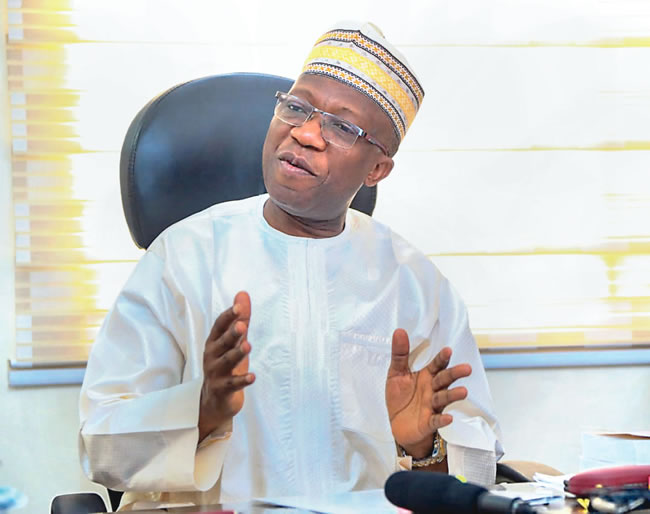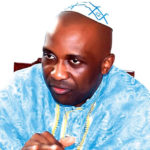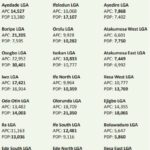Former Minister of National Planning and incumbent Director General of National Institute of Legislative and Democratic Studies (NILDS), Professor Olanrewaju Suleiman, in this interview with KEHINDE AKINTOLA, speaks on the 2023 general election, political culture in the country and other sundry issues.
What are some of the in-roads made since you took over as the Director General of National Institute of Legislative and Democratic Studies?
As you rightly know, our institute is more or less the intellectual base of the Nigerian parliament, the think-tank, the academic hub for Nigerian parliament and other critical stakeholders in democracy. It is a democratic institution and it is a legislative institution, put in place to enhance the capacity of critical actors in democracy; to enhance the capacity of the parliamentarians and the parliamentary staff; to enhance the capacity of every structure that has something to do with deepening democracy in our country, in ECOWAS sub-region and indeed in the continent.
And in the last few years that I took over at the helmsman of this institute we have made some remarkable in-roads in ensuring that we live up to the mandates of the Institute. Notable of these remarkable in-roads that we have made in the last three years is in the aspect of getting our services down to the sub-national level. We observed that our services as an Institute have not really permeated down to the state and local government levels. When you talk of national institute, it’s not only meant for National Assembly. The bulk of the critical actors in democracy and parliaments are at the local level and state levels and as such I saw it as a challenge to get our services and programmes down to the grassroots.
Before now we had just four departments in the Institute so the first thing I needed to do is to expand the institute, the structures, the various organs of the Institute. So, with the blessing of the leadership of the National Assembly and the Governing Council of the Institute, from four departments, we were able to take it to nine departments and we created one department charged addressing the issue of training and capacity for the parliamentary staff, the Parliamentarians and every other actor within democracy and governance.
On the account of our long years of military rule and the high turnover rate of parliamentarians both at the state and federal levels, we realised that we could not just rely on subventions or allocations coming from the federal so that we need to partner with donor agencies and that was why we now strengthen the department not just for training but for international cooperation.
And I’m happy to let you know that from what we have seen so far, we have done remarkably well in getting our services in deepening democracy at the local level; in enhancing the capacities of the various actors at various state assemblies. Today, I can proudly tell you that we have covered almost 29 states in the last two and half years or so. And I want to commend our partners, the Konrad Adenauer Stiftung (KAS) Foundation, the UN Women, the NNRC, the Westminster and quite a lot of them that have supported the Institute in these few years in driving this process.
The story has changed. It’s not the story of where states level have to be grappling because of lack of resources, grappling with how to train their legislators, grappling on how to put a structure, like State Assembly commission in place; grappling with how to come up with manuals on oversight on legislative procedure, we are able to get down to it.
And most importantly beyond the issue of training, capacity building, beyond the issue of research, providing technical assistance for state assemblies, we have gone further in the area of advocacy. Before NILDS was not known for advocacy, people talk of separation of powers, we talk of checks and balances, but we know we are living in a system that really gives power to the Executive more than the Legislature. We are living in a democracy that is tilted towards the Executive. I call it Executive democracy where the president is more or less all-in-all, where the governors are more or less all-in-all, where the parliament at the state level has nothing to say in the governance of their states, where they are perceived so to speak as an appendage of the governor.
How do we fill that vacuum? How do we beef up that structure? How do we reawaken their consciousness? How do we give them voice? So, NILDS came up to give the parliament assembly voice. And do not be surprised today either people like it or not, the attorney general talks about autonomy for the legislature, we talk about autonomy for the Judiciary, we talk about Executive Order 10, we talk about reforms at the state level, state assemblies. In the last two years, we have been at the centre of this advocacy.
You hardly see speakers speak on most of these issues, but NILDS has taken the responsibility to address the issues with the governance, the Nigerian people and the critical stakeholders. We have organised series of training on it and we have spoken to power on such issues and the result is very clear, to the extent that some governors in some states today have to a large extent conceded autonomy to their state assemblies. In fact, the leading partner state with the institute is Delta. You can now see that today, the outgoing governor has now anointed the speaker of the state. When they are writing the history of how that transition is taking place, I hope they won’t forget this.
That harmony, the relationship, that kind of synergy and collaboration was an account of so many factors. Our contribution is great when you talk about what obtains in Delta State and Akwa Ibom and even to a large extent in Bauchi State and quite a lot of other states too. The entire South-West has been covered, except maybe for Osun State. The entire South-South, Cross River, Rivers, almost everywhere in the South-South, the same thing South-East. Perhaps, the only zone we have not really covered which was born out of security challenge was in the North-East.
So, the story of NILDS has changed from that Institute visibly known at the centre to an Institute now more of a national institute and you can see our impact everywhere, in every sector.
How were you able to get resources to do all of these with the slim budget that is being allocated to you?
Let me commend the leadership of the national assembly for the support, everything is not just about money, yes, money is good but you must be determined, visionary, focused, you must come with an idea of the goal and target you want to achieve.
We came with a vision, the Ninth Assembly had that vision and we keyed into the vision too and everything is now being synchronized. They have not denied us at least of our due in terms of funding, when it comes to funding on issues that bother on capacity building, I think they have been consistent on that. There is no doubt about that.
You could call is meager, but to me what is important is the determination to drive the process and I have addressed this issue that when we saw that we cannot repair everything, we cannot depend solely on federal government to come from the federal allocation. We needed to partner with donor agencies and that has yielded tremendous results.
Let’s quickly look at political parties and political ideologies, going into 2023 elections, will you really say that there is anything called political ideology that can actually drive the process, the way politics is being done in Nigeria?
Ideology is a constellation of visions born out of certain experience. Let’s say ideology is a kind of vision, a kind of idea that was informed by certain realities or certain experiences and political party is an association of people coming together, structurally and formally organised with the sole interest of gaining power. What is key to political parties is one: it must organised; it must be well structured, and ultimately the goal is to get power, take power from the ruling party.
In advanced democracies or in any democracy at all, political parties come out with a clear idea on how they want to drive the process, what they want to achieve, what is their road map. People now examine or try to now benchmark, so to speak, the ideology that shapes the manifesto, the ideology that shapes the principles. In Nigeria’s First and Second Republics, we had political parties with known ideology and we referred to them as a little bit to the left, a little bit to the right and so on.
But as the country is evolving and as we are growing, maybe because of the cosmopolitan nature of the society, maybe because of the increase in population and because of the development anyway, ideology appears disappearing from the political space. In the two major parties we have now, PDP and APC, APC professes progressive ideology, while PDP is known for liberal and conservative ideology so to speak. But the bitter truth is that has anything changed from what PDP professes in the past and what APC is professing now? Has there been any clear-cut demarcation?
No doubt about that, some part of APC, especially the Lagos axis, the Tinubu group, tends to have some progressive outlook and the defunct CPC bloc of the president of that time too tends to have some stint of modern radicalism so to speak. But the fusion of all these, the CPC and ACN, PDP and all these have called to question whether actually the party has any ideology different from PDP.
So, to me, APC professes, free education, want this and that. We want to address poverty and some other things. But as time goes by, they were edged out, they fell onto the same lane of the PDP and as such you cannot really make a difference of what APC stands for as different from what PDP stands for. They are almost the same, treading the same path so to speak in terms of their principle, goal and so on.
Today, people are not aligning with APC because of certain ideology, nor are they aligning with PDP because of certain ideology. What informs people’s alliance now or membership or empathy for this party now is individual interest, group interest or collective interest.
A governor left APC to PDP because he believes his region has not been well treated by PDP, not because of their varied ideology. Another governor left because he believes one person in PDP is too domineering. So, tell me which ideology shaped that defection. Another person left because he believes if he is to remain in PDP in his state, he can never win election. So, where we go in 2023 elections will be hinged on performance. If a governor has performed very well, people are ready to vote for him. What is shaping the political dynamics now is not ideology.
So, how do we come back on track because national development is supposed to be part of this ideology, how do we correct the anomalies?
We can correct the anomalies by the time political leaders forgo, for instance, partisanship on the basis of national goal. We need a lot of reorientation. We need to imbibe a new political culture, what we are now doing, I see it as chop or chop party system. Until all of us, including myself, shift from this prison/prism of human consciousness, it may be difficult. I still believe that both PDP and APC and some other major political parties can still go back and revisit the issue. We will get it right by the time we place people at the centre of our journey. But where we don’t place people at the centre of the journey, then we are going nowhere.
So, we must devices a way of coming up with a new political orientation and culture.
Can we address the issue of money politics by way of amending the electoral act to make sure we de-monetize the process?
This is not about electoral act. Our problem in Nigeria is not about rules, it is not about constitution. It is about attitude. It is about you and I.
We have a beautiful constitution right from the first republic, nothing fundamental is wrong with our constitution. Change the electoral law, review, amend 1, 000 times, if our attitude remains the same we are going nowhere.
Some have called for the postponement of the 2023 elections and the setting up of an interim government. What is your take on this?
Postponement of 2023 elections, yes there could be that fear when you look at the developments in the country that border on insecurity in the forms of insurgency, banditry, kidnapping, terrorism and so on. When you look at all these, the tendency for you to have that fear is there. Those making the call are trying to be futuristic now, that if these things continue, do we stand the chance of having elections next year?
I think it is normal for us to be proactive, to look beyond our immediate and look at what we are doing to return peace back to our polity. The Federal Government is doing its best no doubt about that, but something is missing somewhere and what is missing I keep on repeating it, at every level that we are not as a country. We are yet to build a consensus on how to fight insecurity. Security is a fundamental national project, but even then as a country, we do not even agree on how to fight it and as long as we don’t agree on how to fight it, the terrorists will continue to have sympathy from some people and that will give them the zeal to continue doing the dirty things they are doing.
People don’t provide intelligence, perhaps with the name of certain sentiments and biases, we are still trying to protect the insurgents; oh they are our people, they should not be killed, they should not be harmed. You don’t provide intelligence to the security agencies, the security agencies are not gods, neither are they angels. If you don’t give them the requisite intelligence, they wouldn’t know what to do.






